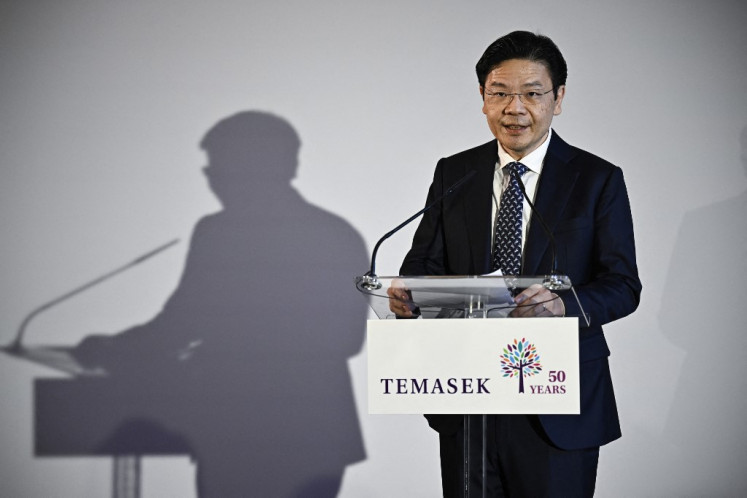Passing on Gandhi’s legacy
Words Sebastian Partogi Photos Arief SuhardimanEducation and the arts are key to preserving Mahatma Gandhi’s values of peace and tolerance, Indian Ambassador to Indonesia and Timor Leste Pradeep Kumar Rawat said on the sidelines of the International Non-violence Day commemoration, in conjunction with the 148th anniversary of the late Indian leader’s birth, on Oct
Change Size

Words Sebastian Partogi Photos Arief Suhardiman
Education and the arts are key to preserving Mahatma Gandhi’s values of peace and tolerance, Indian Ambassador to Indonesia and Timor Leste Pradeep Kumar Rawat said on the sidelines of the International Non-violence Day commemoration, in conjunction with the 148th anniversary of the late Indian leader’s birth, on Oct. 2 in the Gandhi Memorial Intercontinental School (GMIS) in Jakarta.
During the commemoration, GMIS students from different nationalities, including Indonesians, Indians, South Koreans and many more, celebrated the occasion by presenting a multicultural music and dance presentation as well as providing donations to local underprivileged communities.
The ceremony was also attended by several ambassadors from various countries such as India, Azerbaijan, Kazakhstan, Bangladesh, Serbia, Uzbekistan and Zimbabwe.
Mohandas Karamchand Gandhi was born in 1869 in the Indian city of Porbandar, Gujarat. After the completion of his studies in London, Gandhi started a career as a lawyer and an activist in South Africa for nearly 20 years before returning to India. Revered the world over for his nonviolent philosophy of passive resistance, he was known to his adherents as Mahatma, or “the great-souled one.”
To honor his legacy, the United Nations General Assembly, through a resolution on June 15, 2007, established Gandhi’s birthday as the International Day of Non-violence to disseminate the message of non-violence, including through education and public awareness. The commemoration also seeks to secure a culture of peace, tolerance, understanding and non-violence.
Gandhi’s principles of non-violence and open-mindedness are more relevant than ever in today’s world marked by growing inequality as well as increased violence, religious intolerance and extremism across the globe, according to Ambassador Rawat.
“School curriculums should inculcate open-mindedness among their students, so they are always open to new ideas and thoughts, leading to creativity and innovation,” he said.
According to Rawat, interaction among students and teachers from different nationalities is also vital to breed understanding and reduce conflicts.
“We should create these interactions more frequently, involving teachers and students from different areas and devise an exchange program for them,” Rawat said.
Bangladeshi Ambassador to Indonesia Azmal Kabir said the cultural program presented during the commemoration was “of immense importance” for both parents and students alike. He also lauded the international atmosphere offered by the school.
“Students from different nationalities and religions learn here, thereby learning to cope with a multinational environment to get a head start on how to conduct themselves in the modern world, especially once they have to live away from their parents,” he said.
The school was established in 1950 as the oldest international school in Jakarta, a year before the Jakarta International School (now Jakarta Intercultural School) was established in 1951. Named after the iconic Indian leader, the school strives to instill Gandhi’s values of non-violence and tolerance as well as charity among its students, who come from various nationalities.Thanks to its quality education, its students have been accepted at prestigious universities across Europe, America and Australia.
Besides education, Rawat said he believed that the arts and sports activities could actually inspire a sense of solidarity among human beings from different backgrounds.
“These programs can invite people from many different backgrounds. Music, for example, has no language. We should strive to create more arts and cultural programs. Exercises like yoga, for example, could be attended by people from all walks of life, who can [use their practice sessions to] talk about their own personal experiences in practicing yoga,” he said.
Venezuelan Ambassador to Indonesia Gladys F. Urbaneja Durán said that as a country that had joined the Non-Aligned Movement (NAM) — a significant milestone of which was attained during the historic 1955 Asian-African conference in Bandung, West Java – her country believed deeply in non-violent practices that prioritized dialogue.
The Bandung conference featured Indonesian and Indian leaders, namely Sukarno and Jawaharlal Nehru, respectively.
“Therefore, we always invite all countries of the world to respect the 10 principles of Bandung [drafted during the conference],” she said, referring to the 10 basic principles of international relations to maintain and promote world peace and cooperation.









